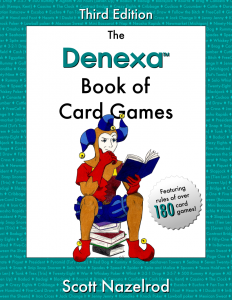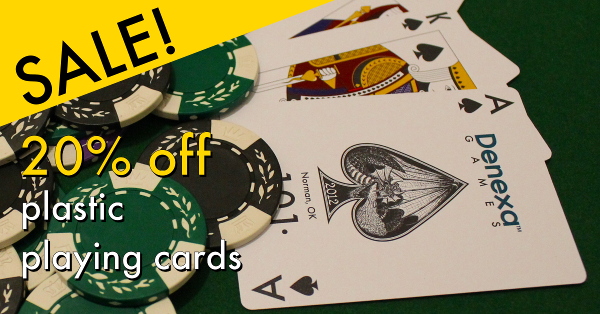Three Thirteen Rummy
Three Thirteen Rummy is a simple rummy game for two or more players. Aficionados of Gin Rummy will find its closed melding style quite familiar, but it allows for much larger, more social games. Additionally, gradually-increasing hand sizes and different wild cards on each hand mean that each hand plays slightly differently!
Like many games, Three Thirteen Rummy has been adapted as a commercial game with a proprietary deck. Called Five Crowns, the proprietary version of the game introduces a fifth suit, stars, and six jokers, expanding the deck to 116 cards!
Object of Three Thirteen Rummy
The object of Three Thirteen Rummy is to have the lowest score at the end of eleven hands. This is achieved by being the first player to arrange all of your cards into melds.
Setup
The number of cards you need for Three Thirteen Rummy depends on the number of players. For two players, you’ll need one standard 52-card deck of playing cards, like Denexa 100% Plastic Playing Cards. When playing with three or four, shuffle in a second deck. For five or six, add a third deck, and so on. You also need something to keep score with; pencil and paper will perform admirably.
The number of cards dealt varies from hand to hand. On the first hand of the game, deal each player three cards. On the second hand, deal four cards, and so on each hand, increasing by one card each hand. The eleventh and final hand will consist of thirteen cards. Place the deck stub in the center of the table, forming the stock. Turn the top card of the stock face up. This card, the upcard, will be the first card of the discard pile.
Game play
Game play begins with the player to the dealer’s left. They may take either the top card of the discard pile, or the top card of the stock. They then end their turn by discarding a card from their hand. Play then passes to the next player to the left, who follows the same procedure, and so on and so forth.
As with most rummy games, Three Thirteen Rummy revolves around melds, which are combinations of three or more cards. Valid melds include three or more of a kind, or a run or sequence, such as 5-6-7, of the same suit. Aces are low, and kings are high, and a sequence cannot progress from one to the other (Q-K-A and K-A-2 are not valid melds). The players’ goal is to form their entire hand into melds, eliminating their deadwood (unmatched cards). Melds are kept in the hand when formed, not laid out on the table.
A different rank of cards is wild on each hand. On the first hand, 3s are wild. On the second, 4s are wild, and so on, until the eleventh hand, when kings are wild. Wild cards may substitute for any other card in a meld. There is no limit to how many wild cards can be in a meld. Melds of all wild cards are also acceptable.
In the rare event that the hand continues until the stock is exhausted, set the upcard aside, shuffle the rest of the discards, and turn them face down to form a new stock.
Ending the hand
When a player has formed their entire hand into melds, they are entitled to go out. They discard as normal, announcing that they are going out as they are doing so. Each opponent then takes one final turn. The hand ends when the turn reaches the player that went out.
The player who went out reveals their hand, arranging it into melds to allow the other players to verify that they have no deadwood. The opponents do the same. Each player then scores the value of their deadwood (with the player that went out scoring zero for the hand). As in Gin Rummy, aces are worth one point, face cards worth ten, and all other cards their face value. Wild cards are scored the same as they would be if they were not wild. Players may not lay off deadwood on their opponents’ melds.
After the end of the hand, the deal rotates, and the cards are shuffled and a new hand is dealt. Game play continues until eleven rounds have been played. The player with the lowest score at the end of the game is the winner.


